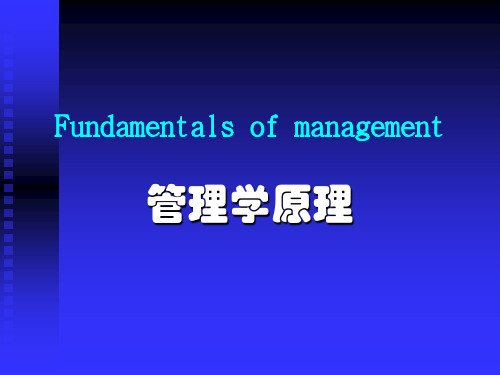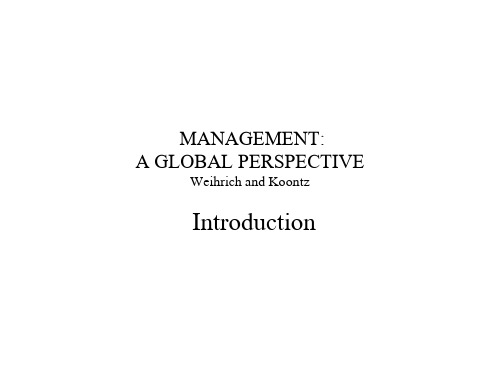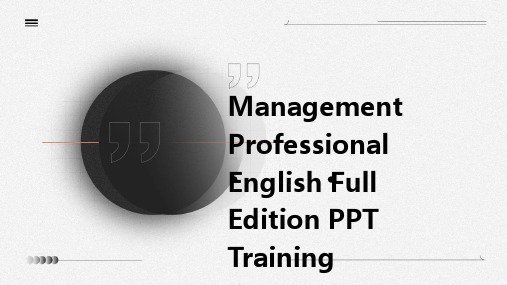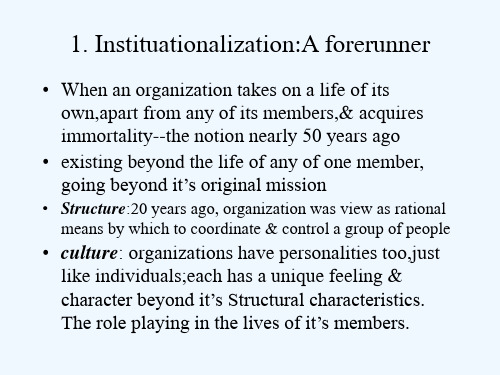管理学英文版课件 组织文化与环境 Organizational Culture and Environment
合集下载
管理学英文版-PPT课件

Globalization Ethnocentrism parochialism
Right or Rowing
企业已经缴纳教育附加税,因而没有义 务再资助办学。 援助灾民是企业的社会责任,因此,每 一个企业都必须进行赈灾活动。 在香烟外盒写上“吸烟有害健康”是毫 无意义的,因此是没有必要的。 既然政府的规定是50%,宝洁公司就没有 必要承诺100%的使用再循环包装纸。
Fundamentals of management
管理学原理
Chapter 1
manager and management
第一章
管理者与管理
Discussion 讨论
1961年,日本松下公司的山田电器厂遇 到了一个开关质量难题。实际上,这个 开关的装配操作很简单:从装有许多弹 簧的盒内每次取出两个装入开关,再装 上按钮。让山田厂长困惑的是,无论采 取什么质量管理方法,都不能使工人避 免偶尔忘记装入弹簧。 你能帮助山田厂长解决这个难题吗?
地区协调员
全球汽车 配件部
全球 工业部
全球仪器 产品部
全球原料 采购部
全球卡车 配件部
全球矩阵结构
国际执行委员会 业务领域 变压器 运输 德国 挪威 阿根廷/巴西 西班牙/葡萄牙
生产
当地公司
微软的组织结构
董事长/首席架构师:比尔•盖茨 CEO/总裁:史蒂夫•鲍尔默 营运和 后勤部 产品部门 全球销售、市场 和服务部 亚洲销售、市场 和服务部 亚洲产品 部门 微软在 中国的 机构 微软中国研究 开发中心
新闻发布,通报事项
Decisional 决策
Entrepreneur
企业家
制定战略,控制执行过程
管理学(英文版全套课件)

• Malcolm Baldrige National Quality Award established by the U.S. Congress in 1987 • ISO 9000, pioneered by the Europeans • European Quality Award given by the European Foundation
Arguments Against Social Involvement
• • • • • • • Violation of profit maximization Dilution of purpose Costs Too much power Lack of skills Lack of accountability Lack of universal support
• France
– Le Plan and the Cadre
• Germany
– Authority and Codetermination
• Korea
– Chaebol and Inhwa
Japanese Management
• Lifetime Employment • Seniority System • Decision Making in Japan
Chapter 2. Management and Society: The External Environment, Social Responsibility, and Ethics
The Organization and Its External Environment
Arguments for Social Involvement
Definition of Whistle-Blowing
Arguments Against Social Involvement
• • • • • • • Violation of profit maximization Dilution of purpose Costs Too much power Lack of skills Lack of accountability Lack of universal support
• France
– Le Plan and the Cadre
• Germany
– Authority and Codetermination
• Korea
– Chaebol and Inhwa
Japanese Management
• Lifetime Employment • Seniority System • Decision Making in Japan
Chapter 2. Management and Society: The External Environment, Social Responsibility, and Ethics
The Organization and Its External Environment
Arguments for Social Involvement
Definition of Whistle-Blowing
管理学英文课件 (17)

Mass customization – providing customers
with a product when, where, and how they want it.
• Lean organization – an organization that understands what customers want, identifies customer value by analyzing all activities required to produce products, and then optimizes the entire process from the customer’s perspective.
CURRENT ISSUES IN MANAGING OPERATIONS
Technology’s Role in Manufacturing
– Increased automation and integration of production facilities with business systems to control costs.
ISO 9000 – a series of international quality
management standards that set uniform guidelines for processes to ensure that products conform to customer requirements.
MANAGING OPERATIONS MODULE
18b - 1
THE ROLE OF OPERATIONS MANAGEMENT
Operations Management – the transformation
管理学原理英文版课件Chapter 2 The Management Environment

◦ Serve customers better, enhance production, provide better information, etc.
E-Organizations
• E-commerce (sales side of electronic business): any computer transaction that occurs when data are processed and transmitted over the internet
Entrepreneurship – the process of starting a business venture, organizing the necessary resources, and assuming the risks and rewards
Important Themes:
Public Expectations
Arguments for and against social responsibility by businesses must be
considered by manaibility = a firm’s obligation, beyond what is required by the law and economics, to pursue long-term goals that benefit society
advantages ◦ Starting the venture ◦ Managing the venture
Managing the Workforce
Downsizing – create more efficient operations through extensive layoffs
E-Organizations
• E-commerce (sales side of electronic business): any computer transaction that occurs when data are processed and transmitted over the internet
Entrepreneurship – the process of starting a business venture, organizing the necessary resources, and assuming the risks and rewards
Important Themes:
Public Expectations
Arguments for and against social responsibility by businesses must be
considered by manaibility = a firm’s obligation, beyond what is required by the law and economics, to pursue long-term goals that benefit society
advantages ◦ Starting the venture ◦ Managing the venture
Managing the Workforce
Downsizing – create more efficient operations through extensive layoffs
《管理学》(Management)(英文大纲).ppt

2019-9-9
感谢你的欣赏
11
Part 4 Organizing
Chapter 10 Organizational Structure and Design
Defining organizational structure Organizational design decisions Common organizational designs
The decision-making process The pervasiveness of decision making The manager as decision maker
2019-9-9
感谢你的欣赏
8
Part 3 Planning(Cont’d)
Chapter 7 Foundations of Planning
2019-9-9
感谢你的欣赏
16
Part 5 Leading(Cont’d)
Chapter 15 Understanding Groups and Teams
Understanding group behavior Turning group into effective teams Developing and managing effective teams
2019-9-9
感谢你的欣赏
21
Part 6 Controlling(Cont’d)
Chapter 20 Controlling for Organizational Performance
Organizational performance Tools for monitoring and measuring
管理学(双语)chap1 Introduction to Management and Organi

• □美国邓恩和布兹特里斯信用分析公司调研结 果表明,有90%破产企业是由于管理不善所致。
• □我国国有企业80%以上的亏损企业是由于管 理不善所致。
2020/10/18
1-9
1. Who Are Managers?
• Manager – --someone who coordinates and oversees the works
台高筑,对下属公司的管理失控,陷入了全面危机。
•
1997年,国务院不得不对该公司进行全面清理整顿。一
个曾红极一时的国有大公司倒下了。
2020/10/18
1-7
•话题
你认为海尔与中联公司成败的 关键是什么?
2020/10/18
1-8
• □上述两个案例,一个由小到大,到强;一个 由大到乱,到衰,这一成一败说明了企业的成败 在于科学的管理,在于正确的战略。
• Informational - receiving, collecting, and disseminating information
• Decisional - revolve around making choices
– emphasis that managers give to the various roles seems to change with their organizational level
– First-line managers - at the lowest level of management and manage the work of nonmanagerial employees who are directly involved with the production or creation of the organization’s products
• □我国国有企业80%以上的亏损企业是由于管 理不善所致。
2020/10/18
1-9
1. Who Are Managers?
• Manager – --someone who coordinates and oversees the works
台高筑,对下属公司的管理失控,陷入了全面危机。
•
1997年,国务院不得不对该公司进行全面清理整顿。一
个曾红极一时的国有大公司倒下了。
2020/10/18
1-7
•话题
你认为海尔与中联公司成败的 关键是什么?
2020/10/18
1-8
• □上述两个案例,一个由小到大,到强;一个 由大到乱,到衰,这一成一败说明了企业的成败 在于科学的管理,在于正确的战略。
• Informational - receiving, collecting, and disseminating information
• Decisional - revolve around making choices
– emphasis that managers give to the various roles seems to change with their organizational level
– First-line managers - at the lowest level of management and manage the work of nonmanagerial employees who are directly involved with the production or creation of the organization’s products
管理专业英语完整版PPT培训课件

Scientific management: This theory emphasizes the use of scientific methods to improve work efficiency and productivity It emphasizes the standardization of work processes, the use of time and motion studies, and the development of job descriptions and instructions
Analysis
目录
• Improvement of Management Professional English Application Ability
• Summary and Outlook
目录
01
Introduction
Training objectives and significance
Organization development
Organization development is a management approach that emphasizes changes and development in organizations It uses a variety of techniques to help organizations improve their performance, including team building, training, and reconstruction
Overview of Training Content
Management related English documents
最新整理组织文化英文.ppt

1. Instituationalization:A forerunner
• When an organization takes on a life of its own,apart from any of its members,& acquires immortality--the notion nearly 50 years ago
• substitute for formalization: 2 different roads to a
common destination. Formal rules & regulations
will be internalized in employees when they
accepted the -- culture.
Chap. 17 Organization Culture
§14.3 Creating & Sustaining Culture
1.How a Culture Begins
• Largely due to what it has done befhad with those endeavors
motive:good,evil,mixed; • Activity orientation--doing,being,control; • Focus of responsibility--
individualistic,group,hierarchical; • Conception of space--private,mixed,public
descriptive term perceived, evaluative
3. Cultural Typologies
• When an organization takes on a life of its own,apart from any of its members,& acquires immortality--the notion nearly 50 years ago
• substitute for formalization: 2 different roads to a
common destination. Formal rules & regulations
will be internalized in employees when they
accepted the -- culture.
Chap. 17 Organization Culture
§14.3 Creating & Sustaining Culture
1.How a Culture Begins
• Largely due to what it has done befhad with those endeavors
motive:good,evil,mixed; • Activity orientation--doing,being,control; • Focus of responsibility--
individualistic,group,hierarchical; • Conception of space--private,mixed,public
descriptive term perceived, evaluative
3. Cultural Typologies
- 1、下载文档前请自行甄别文档内容的完整性,平台不提供额外的编辑、内容补充、找答案等附加服务。
- 2、"仅部分预览"的文档,不可在线预览部分如存在完整性等问题,可反馈申请退款(可完整预览的文档不适用该条件!)。
- 3、如文档侵犯您的权益,请联系客服反馈,我们会尽快为您处理(人工客服工作时间:9:00-18:30)。
– Repetitive sequences of activities that express and reinforce the values of the organization
• Material Symbols 有形信条
– Physical assets distinguishing the organization
The Manager: Omnipotent or Symbolic? • Symbolic View of Management管理象征论
– Much of an organization’s success or failure is due to external forces outside of managers’ control. – The ability of managers to affect outcomes is influenced and constrained by external factors. • The economy, customers, governmental policies, competitors, industry conditions, technology, and the actions of previous managers – Managers symbolize control
• 文化力作为个人之魂、群体组织之魂、国 家之魂的外化,既是国家精神力量和智力 水平的综合反映,又是群体组织精神力量 和智能水准的有力表征;既是综合国力的 重要构成要素,又是综合群体组织力的重 要组成部分。无论对群体组织和整体社会 来讲,文化力都是一种内在的强大的驱动 力。
8
期望员工表现出精确性、分析和关注细节 的程度 管理者关注结果或成 果,而不是如何取得 鼓励员工创新并承担风 关注细节 这些成果的程度 险的程度 低………………..高 创新与风险承受力 低………………..高 成果导向 低………………..高
The Manager: Omnipotent or Symbolic?
• Omnipotent View of Management管理万能论
– Managers are directly responsible for an organization’s success or failure. – The quality of the organization is determined by the quality of its managers.
11
• Factors Influencing the Strength of Culture
– – – – – Size of the organization 组织的规模 Age of the organization 历史 Rate of employee turnover 雇员的流动程度 Strength of the original culture 文化起源的强烈程度 Clarity of cultural values and beliefs 文化价值和信念 的清晰程度
14
How Employees Learn Culture
• Stories 故事
– Narratives of significant events or actions of people that convey the spirit of the organizationhe Organization’s Culture
• Describe the seven dimensions of organizational culture. • Discuss the impact of a strong culture on organizations and managers. • Explain the source of an organization’s culture. • Describe how culture is transmitted to employees. • Describe how culture affects managers.
12
How Culture Begins
• Founders hire and keep only employees who think and feel the same way they do. • Founders indoctrinate and socialize these employees to their way of thinking and feeling. • The founders’ own behavior acts as a role model that encourages employees to identify with them and thereby internalize their beliefs, values, and assumptions.
L E A R N I N G O U T L I N E (cont’d)
• Current Organizational Cultural Issues Facing Managers
• Describe the characteristics of an ethical culture, an innovative culture, and a customer-responsive culture. • Discuss why workplace spirituality seems to be an important concern. • Describe the characteristics of a spiritual organization.
组织文化
稳定性 低………………..高 组织决策和行动 强调维持现状的 程度 进取性 低………………..高 团队导向 低………………..高
员工导向 低………………..高 管理决策中考虑结果 对组织成员影响的程 度
员工富有进取性和竞争性而不 © Prentice Hall, 2002是合作性的程度
围绕团队而不是个人 来组织工作的程度
Managerial Decisions Affected by Culture 受文化影响的管理决策
• Planning
• The degree of risk that plans should contain • Whether plans should be developed by individuals or teams • The degree of environmental scanning in which management will engage
– Whatever managerial actions the organization recognizes as proper or improper on its behalf – Whatever organizational activities the organization values and encourages – The overall strength or weakness of the organizational culture
• Organizing
• How much autonomy should be designed into employees’ jobs • Whether tasks should be done by individuals or in teams • The degree to which department managers interact with each other
L E A R N I N G O U T L I N E (cont’d)
• The Environment • Describe the components of the specific and general environments.
• Discuss the two dimensions of environmental uncertainty. • Identify the most common organizational stakeholders. • Explain the four steps in managing external stakeholder relationships.
13
How is Organizational Culture Continued?
• Recruitment of like-minded employees who “fit” • Socialization of new employees to help them adapt to the culture
Chapter 3
Organizational Culture and Environment: The Constraints 组织文化与环境: 组织文化与环境:约束力量
LEARNING OUTLINE
• The Manager: Omnipotent or Symbolic
• Contrast the action of manager according to the omnipotent and symbolic views. • Explain the parameters of managerial discretion.
• Language 语言
– Acronyms and jargon of terms, phrases, and word meanings specific to an organization
15
How Culture Affects Managers
• Cultural Constraints on Managers
• Material Symbols 有形信条
– Physical assets distinguishing the organization
The Manager: Omnipotent or Symbolic? • Symbolic View of Management管理象征论
– Much of an organization’s success or failure is due to external forces outside of managers’ control. – The ability of managers to affect outcomes is influenced and constrained by external factors. • The economy, customers, governmental policies, competitors, industry conditions, technology, and the actions of previous managers – Managers symbolize control
• 文化力作为个人之魂、群体组织之魂、国 家之魂的外化,既是国家精神力量和智力 水平的综合反映,又是群体组织精神力量 和智能水准的有力表征;既是综合国力的 重要构成要素,又是综合群体组织力的重 要组成部分。无论对群体组织和整体社会 来讲,文化力都是一种内在的强大的驱动 力。
8
期望员工表现出精确性、分析和关注细节 的程度 管理者关注结果或成 果,而不是如何取得 鼓励员工创新并承担风 关注细节 这些成果的程度 险的程度 低………………..高 创新与风险承受力 低………………..高 成果导向 低………………..高
The Manager: Omnipotent or Symbolic?
• Omnipotent View of Management管理万能论
– Managers are directly responsible for an organization’s success or failure. – The quality of the organization is determined by the quality of its managers.
11
• Factors Influencing the Strength of Culture
– – – – – Size of the organization 组织的规模 Age of the organization 历史 Rate of employee turnover 雇员的流动程度 Strength of the original culture 文化起源的强烈程度 Clarity of cultural values and beliefs 文化价值和信念 的清晰程度
14
How Employees Learn Culture
• Stories 故事
– Narratives of significant events or actions of people that convey the spirit of the organizationhe Organization’s Culture
• Describe the seven dimensions of organizational culture. • Discuss the impact of a strong culture on organizations and managers. • Explain the source of an organization’s culture. • Describe how culture is transmitted to employees. • Describe how culture affects managers.
12
How Culture Begins
• Founders hire and keep only employees who think and feel the same way they do. • Founders indoctrinate and socialize these employees to their way of thinking and feeling. • The founders’ own behavior acts as a role model that encourages employees to identify with them and thereby internalize their beliefs, values, and assumptions.
L E A R N I N G O U T L I N E (cont’d)
• Current Organizational Cultural Issues Facing Managers
• Describe the characteristics of an ethical culture, an innovative culture, and a customer-responsive culture. • Discuss why workplace spirituality seems to be an important concern. • Describe the characteristics of a spiritual organization.
组织文化
稳定性 低………………..高 组织决策和行动 强调维持现状的 程度 进取性 低………………..高 团队导向 低………………..高
员工导向 低………………..高 管理决策中考虑结果 对组织成员影响的程 度
员工富有进取性和竞争性而不 © Prentice Hall, 2002是合作性的程度
围绕团队而不是个人 来组织工作的程度
Managerial Decisions Affected by Culture 受文化影响的管理决策
• Planning
• The degree of risk that plans should contain • Whether plans should be developed by individuals or teams • The degree of environmental scanning in which management will engage
– Whatever managerial actions the organization recognizes as proper or improper on its behalf – Whatever organizational activities the organization values and encourages – The overall strength or weakness of the organizational culture
• Organizing
• How much autonomy should be designed into employees’ jobs • Whether tasks should be done by individuals or in teams • The degree to which department managers interact with each other
L E A R N I N G O U T L I N E (cont’d)
• The Environment • Describe the components of the specific and general environments.
• Discuss the two dimensions of environmental uncertainty. • Identify the most common organizational stakeholders. • Explain the four steps in managing external stakeholder relationships.
13
How is Organizational Culture Continued?
• Recruitment of like-minded employees who “fit” • Socialization of new employees to help them adapt to the culture
Chapter 3
Organizational Culture and Environment: The Constraints 组织文化与环境: 组织文化与环境:约束力量
LEARNING OUTLINE
• The Manager: Omnipotent or Symbolic
• Contrast the action of manager according to the omnipotent and symbolic views. • Explain the parameters of managerial discretion.
• Language 语言
– Acronyms and jargon of terms, phrases, and word meanings specific to an organization
15
How Culture Affects Managers
• Cultural Constraints on Managers
